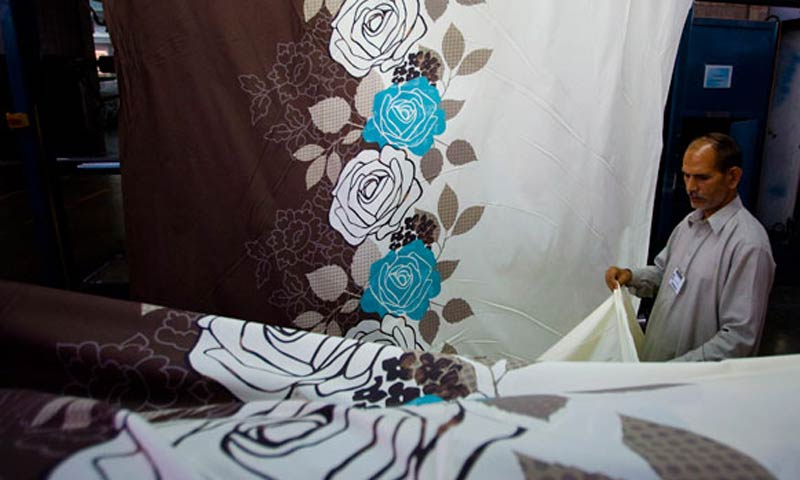Return of the ‘feel good’ sentiments
 The Pakistani industry is gearing up to revitalise investment.
There is a buzz, not just in textiles, but in several other sectors
hoping to capitalise on the improving business environment.
The Pakistani industry is gearing up to revitalise investment.
There is a buzz, not just in textiles, but in several other sectors
hoping to capitalise on the improving business environment.A series of official measures during the concluding month of the last calendar renewed business confidence, which was reported to be cracking up in the initial months of the Nawaz Sharif government.
About two months back, businessmen complained that the PML-N government was dragging its feet on issues it promised to resolve before elections. They expressed frustration over the cold attitude of Finance Minister Ishaq Dar’s economic team towards the corporate sector.
They were also irked with the rising cost of production because of repeated increases in the cost of utilities, including power. Double digit inflation and growing vulnerability on the external front troubled them, as the rupee dipped to over 110 to a dollar in the open market, and reserves depleted to dangerously low levels. Souring of relations with India agitated business segments charmed by the huge market next door.
“We are impatient as a nation. It takes time to turn a company around. Pakistan is a fairly big country in grips of complex, long standing problems. It is not easy for anyone to switch economic fortunes instantly. I feel that the government is on the right track. Energy, circular debt, loan liabilities were all big ticket items. It would be unfair not to acknowledge the government’s efforts to deal with them,” former commerce minister Abdul Razak Dawood told Dawn over telephone from Lahore.
“It does not mean that I endorse all government policies. I am not comfortable with the tax amnesty scheme, which is unfair as it penalises honest taxpayers and rewards tax evaders. For Pakistan to attain sustainability, we’ve got to get the tax- to-GDP ratio right. To this end, the tax base needs to be broadened and tax laws enforced indiscriminately,” he added.
Business sentiments got a boost by a series of events in the last one month. First, Pakistan was granted the GSP Plus status by the EU. This was followed by deceleration in the inflation rate, which returned to single digits from over 10 per cent in November. The government announced to divert gas to industry from power generation.
As tensions eased, the prime minister announced to separate trade and politics in bilateral relations with India and move ahead with trade liberalisation plans.
The rupee started its upward journey as the government, through a combination of measures, cleared liabilities on time; managed to get fresh dollar deposits; and succeeded in driving speculators out of the exchange market.
Some market sources suggested a role of exporters in the reserves buildup, which sustained the rupee’s recovery.
“I am told that gas was diverted to industry by the government after exporters gave an undertaking to bring back the export proceeds they parked outside Pakistan,” said an informed source, while hinting at the $500 million fresh inflows in the banking system.
But textile tycoons rubbished the rumour. “It is not viable for the corporate sector to lock its liquid assets anywhere. These are huge establishments and any interruption in cash flow can disrupt the production cycle. Some petty exporters might be indulging in such practice, but I am not aware of it,” Rafique Ibrahim, a senior executive of the Al Karam Group, said when reached over telephone for comments.
“To me, it makes sense if businessmen pitched in their bit to reduce external sector vulnerability. People remember the 1998 fiasco, and will be willing to do all in their means to avoid a repeat of emergency measures, which hurt them and their businesses more than anyone else,” Majyd Aziz, a business leader, told Dawn.
An insider in the federal finance ministry endorsed Ibrahim’s view. “The finance minister’s statement proved to be magical. In the currency market, expectations lead the trend. The moment the rupee signaled strength, people rushed to encash dollars. The dip in demand further weakened the greenback, and reserves started improving,” he argued.
Mohammad Sohail, CEO of Topline Securities, confirmed the infectious ‘feel good’ factor in business circles. “I see the economy picking up at a pace faster than many would expect. The six per cent growth in large-scale manufacturing in the last quarter indicates the direction the economy is heading to. The goodwill for Nawaz Sharif seems to be translating into material support for his government,” he commented.
For the sudden mysterious rise in dollar deposits in December 2013, he felt the clearance of stuck up five billion rupees worth of commissions of exchange companies might also have been instrumental in the buildup of the foreign currency.







.jpg)

0 comments:
Post a Comment